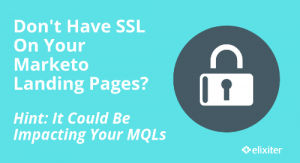 When it comes to handling user information, safe and secure are two practices that come to mind almost immediately. No one ever says, “Hey! Let’s open our database to the entire internet.” That would be crazy.
When it comes to handling user information, safe and secure are two practices that come to mind almost immediately. No one ever says, “Hey! Let’s open our database to the entire internet.” That would be crazy.
Imagine you’re the user (this shouldn’t be hard) submitting your personal information on a website to a company you feel confident will handle your information with care. Then, ALERT! “Not Secure” animates across your browser bar.
Not only is this a bad user experience that might stop the most interested buyer in his/her tracks, but the confidentiality of the data being transferred may be compromised. A lack of data encryption during transit puts your user’s data at risk, and you’ve instantly lost the trust of your user (and you don’t even know his/her email address yet).
Not having secure Marketo landing pages may already be affecting your lead generation efforts and your overall business. Hosting unsecure pages:
- Reduces organic search traffic since unsecure pages are deprioritized
- Increases landing page bounce rates
- Reduces user confidence when submitting forms
A Simple Scenario
If an average closed won deal is worth $500,000, and to close a deal it takes 100 MQLs, then each MQL is worth $5,000.
Now, if filling out the Demo Request form on your Marketo landing page is an automatic MQL, and that form receives 300 form fills per year. Even a 1% increase (3 more requests) in Demo Requests is worth $15,000 over the course of the year. And that is just for one form; think of how many forms you have hosted on Marketo landing pages!
What do I have to do in Marketo?
Your Marketo landing pages are not secure by default, even if your core website is secure. More importantly, even with an SSL Certificate enabled for your Marketo instance, your pages still might not be secure.
Securing your Marketo landing pages once an SSL Certificate has been enabled can be a long and arduous process. All references to http:// need to be updated, and these updates might be needed on templates, snippets, individual pages, variables, editable regions, tokens, fields, etc.
Depending on the amount of assets in your Marketo instance, this can be a considerable project to tackle, but it is one you don’t have to attempt on your own. Our experts specialize in making these changes for clients, saving them time and headaches.
